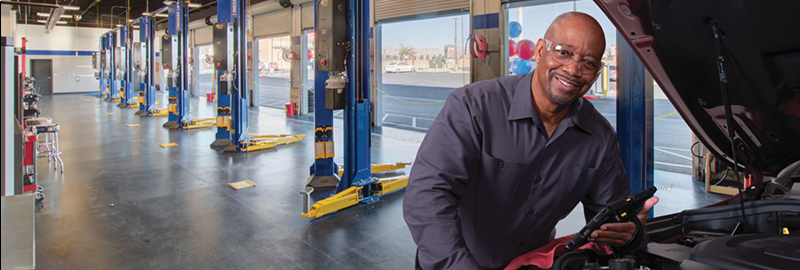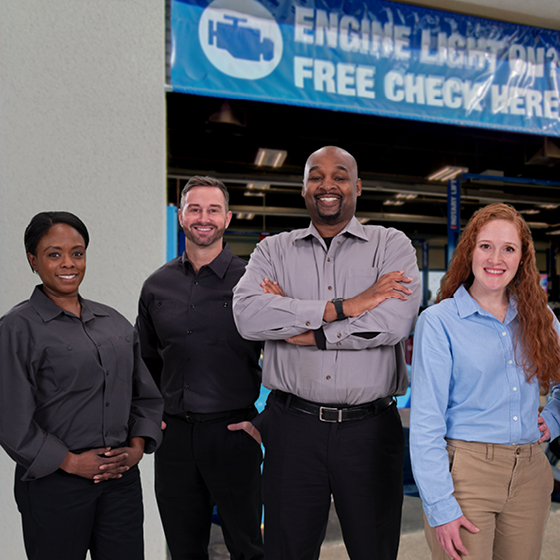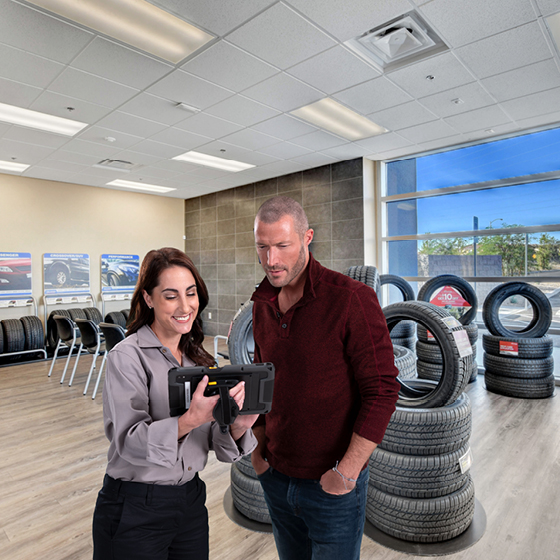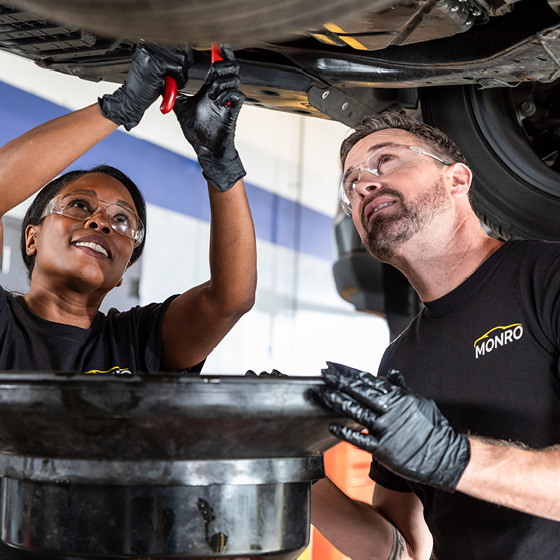Considering a multi-point car inspection? Read on to find out what’s included and get a clear idea of what to expect.

What to Expect During a Multi-Point Vehicle Inspection
Many mechanics and automotive centers offer their own version of multi-point inspections. Before you go, do some research to find out what exactly is covered to make sure you’re getting the most out of your inspection. A thorough check-up should evaluate critical components, including the engine, brakes, tires, and steering.
At Tire Choice, we offer our FREE ConfiDrive Performance Review with every visit. This multi-point vehicle inspection is designed to keep you and your vehicle safe to give you confidence behind the wheel. It includes a 32-point checklist that complies with The Uniform Inspection and Communication Standards of the Automotive Maintenance Repair Association (AMRA).
Below is the list of components that our skilled technicians will include in your ConfiDrive Performance Review.
Basic Checks
Dashboard Lights:
Technicians will check for warning lights on your dashboard and address any issues. If warning lights are on, it could mean problems such as engine issues, low oil pressure, or a malfunctioning sensor. Ignoring these lights may lead to engine damage or vehicle breakdown. Technicians will also ensure all your dashboard lights are functioning correctly. These lights are your car’s way of communicating with you, so it’s essential they’re in working order.
Windshield:
A damaged windshield can compromise driver and passenger safety. It may also obstruct vision, leading to accidents or legal issues if it’s not repaired or replaced. Your technician will inspect the windshield for cracks, chips, or other damage that could impair visibility.
Wiper Blades:
Clear visibility is crucial, especially in poor weather conditions like rain or snow. Worn wiper blades reduce visibility and increase the risk of accidents. Reduced visibility impacts a person’s eyesight, and it can also impact the effectiveness of your vehicle’s safety camera. That spells trouble for adaptive cruise control, lane departure, and accident avoidance, all which rely on a clear line of sight. In addition, poorly functioning wipers can damage the windshield. During our ConfiDrive Performance Review, if your wiper blades show signs of wear, cracks or detachment, technicians will replace them with TRICO PRO wipers. TRICO, a leader in the wiper industry since 1917, provides reliable solutions with features like infinite pressure points and beam blades for all-weather use.
Body:
During an inspection, the vehicle’s body is visually inspected for dents, rust, or structural damage. Visually, dents affect the vehicle’s resale value, while structural damage can impact car safety and rust can lead to further corrosion if left untreated.
Headlights:
Poorly functioning headlights reduce visibility at night, creating a safety hazard for you, your passengers, and other drivers on the road. Our Technicians will check the condition and operation of the headlights, and also check the taillights, brake lights, marker bulbs, turn signals, and license plate lamps.
Cabin Air Filter:
Your technician will inspect the cabin air filter for dirt or clogs. A dirty cabin air filter can lead to reduced airflow and affect the air quality inside your vehicle. You might notice the cooling and heating systems work less effectively, and the air might be less clean and potentially irritating to your lungs. [Brand] partners with FRAM, a trusted name in air filtration, to ensure that you get the best performance from your cabin air filter. Keep in mind that even the most efficient filters need to be replaced every 15,000-30,000 miles, or roughly once a year.
Engine
Engine Air Filter:
A clogged air filter can reduce your engine’s performance and fuel efficiency, potentially leading to engine damage if left unattended. Technicians will evaluate your engine air filter’s condition by checking for dirt or clogs and will replace it if needed. The frequency with which your engine air filter should be replaced will vary depending on several factors, including your car’s make and model and your driving habits. As a general rule, FRAM recommends replacing your engine air filter once every 12,000-45,000 miles.
Oil Level:
Low oil levels or dirty oil can cause engine damage, decreased performance, and potentially engine failure. During an inspection, your technician will check the oil level and its condition and recommend an oil change if necessary.
Power Steering Fluid:
Your technician will inspect the power steering fluid level and its condition. Power steering fluid ensures easy maneuvering, but low or contaminated fluid can result in difficulty steering, making the vehicle unsafe to drive.
Master Cylinder:
The master cylinder maintains brake fluid pressure. A malfunctioning master cylinder can lead to brake failure, putting you and your passengers at risk. Your technician will examine the master cylinder for leaks and ensure it’s functioning properly.
Coolant Level:
Low coolant levels or degraded coolant can lead to your engine overheating, which may result in severe engine damage. Technicians will ensure your coolant level is within the recommended range and examine the coolant’s color and condition.
Coolant Hoses:
Technicians will check coolant hoses for leaks, cracks, or signs of wear. Leaking or damaged coolant hoses can lead to engine overheating and damage.
Belts:
Drive belts play a crucial role in powering various engine components. If belts are worn or loose, it can lead to engine damage or failure. Your technician will assess their condition and tension.
Belt Tensioner:
A malfunctioning belt tensioner can lead to belt failure and engine damage. Technicians will evaluate its performance and ensure proper operation.
Battery Test:
A dead or weak battery can result in a no-start situation that can leave you stranded. Technicians will test your battery for voltage and performance to ensure your vehicle starts reliably.
Exhaust:
The exhaust system in your car is like a chimney for your engine. It helps get rid of the harmful gasses produced when your engine burns fuel and also reduces engine noise. Technicians will inspect for leaks, rust, or damage in the exhaust pipes, muffler, and other components.
Seals and Bearings:
Seals and bearings are protective barriers and support structures for various parts of your vehicle, such as the engine and wheels. They help keep fluids in and dirt out to prevent fluid leaks and increased friction. During an inspection, your technician will check the seals and bearings for leaks, wear, or damage.
Tire Maintenance
Tire Tread:
Insufficient tire tread can result in reduced traction, longer stopping distances, and an increased risk of accidents. Technicians will measure your tires’ tread depth as well as air pressure, and recommend replacements if necessary.
Wheel Alignment:
Technicians will visually check your tires for wear caused by misalignment. In addition to uneven tire wear, misaligned wheels can also cause reduced fuel efficiency and handling problems.
Brake System
Brake Fluid:
Contaminated or low brake fluid can lead to brake failure, a severe safety hazard that compromises your car’s safety and increases the risk of an accident. Technicians will check your brake fluid level and evaluate its condition.
Brake Pads:
Worn brake pads reduce braking effectiveness, potentially leading to longer stopping distances and brake system damage. Your technician will inspect your brake pads’ thickness and recommend replacements if necessary.
Brake Rotors:
Brake rotors should be smooth and free of damage. Damaged or warped brake rotors can cause vibrations, reduced braking performance, and safety risks. Your technician will assess their condition, checking for wear, warping, or damage.
Brake Hardware/Adjuster:
Brake hardware and adjuster components play a role in brake function. Technicians will ensure they are in good condition, as malfunctioning brake hardware or adjusters can result in uneven brake wear and compromised braking performance.
Parking Brakes/Cables:
Parking brakes should engage and release smoothly. During an inspection, your technician will test your parking brake system to ensure proper operation.
Brake Hoses/Lines:
Brake hoses and lines carry the brake fluid from the brake pedal to the actual brakes at each wheel. If brake hoses and lines develop leaks or become clogged, it can affect brake performance and possibly lead to brake failure. Technicians will check for any signs of leaks, wear, or damage and ensure that the brake fluid flows properly without any obstructions.
Steering and Suspension
Shocks and Struts:
Properly functioning shocks and struts contribute to a comfortable ride and good handling. During an inspection, your technician will check for any signs of wear or leakage that can lead to poor handling, reduced stability, and compromised safety.
Ball Joints/Control Arms:
Technicians will inspect ball joints and control arms for wear and damage. Worn or damaged ball joints and control arms can make your car harder to steer by affecting the way your wheels move, potentially leading to accidents.
CV Joints/Boots/U-Joint:
These components connect your car’s engine to the wheels, making sure the spinning power from the engine gets to the wheels smoothly. Your technician will examine the CV joints, boots, and U-joints for wear and damage to prevent potential drivetrain problems and loss of control.
Idler/Pitman Arm:
Idler and pitman arms are crucial components of your vehicle’s steering system, responsible for connecting the steering box or rack to the wheel knuckles. Malfunctioning idler or pitman arms can affect the way your car responds to your steering and make it difficult to control your vehicle. Technicians will ensure proper functioning and evaluate the condition of these components by checking for signs of wear, rust, or looseness.
Bushings/Link Pins:
Your technician will inspect your bushings and link pins to ensure they are in good condition. These components help absorb shocks from the road and allow various parts to move smoothly, but worn bushings or link pins can lead to handling issues and reduced stability.
Tie Rod Ends:
Tie rod ends are an important part of your vehicle’s steering system, linking the steering mechanism to the wheels. Technicians will examine tie rod ends for wear, looseness, or signs of damage. Neglecting these inspections can lead to compromised steering control, affecting your car’s ability to go where you want it to. It can even potentially cause uneven tire wear, resulting in more frequent tire replacements.
Rack/Pinion:
The rack and pinion system (found in vehicles that are not equipped with an idler arm and pitman arm) plays a critical role in the movement of your vehicle’s front wheels, allowing you to steer easily and accurately. Technicians check the rack and pinion system for any leaks, worn-out parts, or damage that can result in loss of steering control.
When to Get a Multi-Point Vehicle Inspection
It is generally recommended to get a multi-point vehicle inspection at least once a year or every 12,000 miles, whichever comes first. However, you may want to consider more frequent inspections if you drive in harsh conditions or if your vehicle is older.
Where to Get a Multi-Point Vehicle Inspection
Tire Choice ensures your vehicle always gets what it needs. To get a free Confidrive Performance Review, simply visit your local Tire Choice service center.
Our team will review your vehicle manufacturer’s maintenance schedule with you, point out any items of concern, and provide you with a written copy of our inspection form and estimate. From there, we’ll help you create a maintenance and repair game plan to prioritize and schedule the work according to your budget and needs.
Stop by a Tire Choice location near you today and get ready for your next adventure with a vehicle that’s as prepared for the journey as you are!





